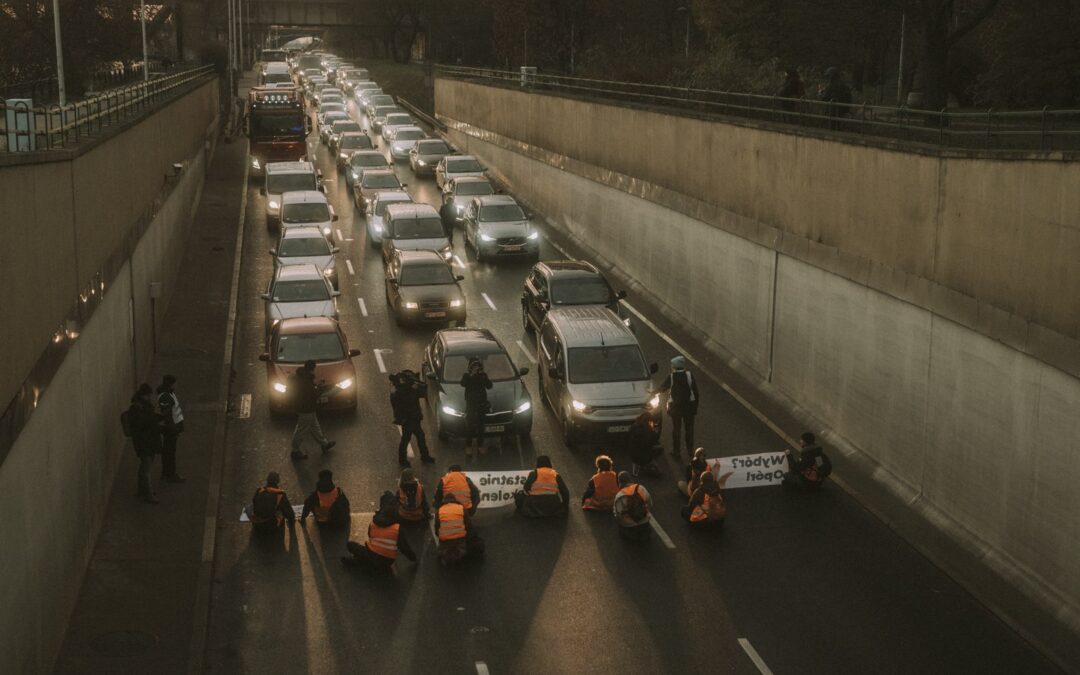Keep our news free from ads and paywalls by making a donation to support our work!

Notes from Poland is run by a small editorial team and is published by an independent, non-profit foundation that is funded through donations from our readers. We cannot do what we do without your support.
Prime Minister Donald Tusk has condemned road blockades by climate activists in Warsaw and has pledged “decisive” action against the protests, which have paralysed parts of the capital. The interior minister, meanwhile, has said that the police will “ruthlessly fight” against the blockades.
Activists from the Last Generation (Ostatnie Pokolenie) climate movement have since last week stepped up a long-running campaign of blocking key routes during peak hours, with some protesters glueing themselves to the roads.
They are demanding that all funding for new expressway and motorway projects instead be directed to improving public transport and that cheap monthly tickets for the use of public transport be introduced.
Ostatnie Pokolenie wraca w ulubione miejsce. To siódma blokada w tym tygodniu. pic.twitter.com/K1DtwVkFBf
— Ostatnie Pokolenie (@OstatniePokolen) December 1, 2024
Their blockades have often prompted an angry response from drivers, in some cases leading to scuffles. In one widely publicised case on Sunday, Michał Kucharczyk, a professional footballer who plays for Legia Warsaw, was seen angrily remonstrating with one group of activists.
Police have regularly been called on to intervene, including forcibly removing protesters from roadways. Warsaw police say that climate activists have blocked traffic in the city over 50 times this year, leading to investigations against 335 individuals, 134 penalty petitions filed in court, and 196 cases still pending.
On Monday, Tusk took to social media to write that “blocking roads, regardless of political intentions, poses a threat to the state and all road users”. He said that he had “called on the appropriate services to react decisively and counteract such actions”.
Blokowanie dróg, niezależnie od politycznych intencji, stwarza zagrożenie dla państwa i wszystkich użytkowników dróg. Wezwałem dziś odpowiednie służby do zdecydowanego reagowania i przeciwdziałania takim akcjom.
— Donald Tusk (@donaldtusk) December 2, 2024
In response, Martyna Leśniak, a member of Last Generation, told broadcaster Polsat that Tusk’s response was “absolutely scandalous”. She said that the climate crisis is a far more severe intrusion into people’s lives than the disruption caused by road blockades.
Meanwhile, the activists have also been criticised by Warsaw mayor Rafał Trzaskowski, who is deputy leader of Tusk’s centrist Civic Platform (PO) party and also one of the leading candidates in next year’s presidential elections.
“Irrespective of what ideas they are defending, blockades firstly harm the cause and secondly are illegal,” said Trzaskowski, quoted by Wirtualna Polska.
As mayor of Warsaw, Trzaskowski has generally been supportive of climate policies, such as banning the burning of coal and introducing a clean transport zone in the city.
From 1 July, older cars will be banned from the centre of Warsaw in what will be Poland's first "clean transport zone".
The city has launched a website allowing drivers to check if their car is among those affected https://t.co/AhyMdK8Dci
— Notes from Poland 🇵🇱 (@notesfrompoland) June 19, 2024
Interior minister Tomasz Siemoniak also condemned the activists’ “completely irresponsible and scandalous behaviour”, which he said caused “danger to people’s health and lives”, reports the Polish Press Agency (PAP).
He pledged that the police would take a “hard” line against such actions and that, if necessary, new regulations would be introduced. “We will fight this ruthlessly,” declared Siemoniak.
A 2022 study found Poland to be the European Union’s least green country. It still relies on coal for almost two thirds of power generation and has the EU’s joint-lowest level of electric car uptake.
A recent study showed that the proportion of people in Poland who are prepared to make changes and sacrifices in their own lives to combat climate change decreased from 13% in 2022 to just 5% this year.
Just 5% of people in Poland say they are prepared to make changes and sacrifices in their own lives to combat climate change, down from 13% in 2022.
The proportion who believe human actions threaten the environment has fallen from 63% in 2019 to 52% now https://t.co/PpSGXD2Zed
— Notes from Poland 🇵🇱 (@notesfrompoland) November 12, 2024

Notes from Poland is run by a small editorial team and published by an independent, non-profit foundation that is funded through donations from our readers. We cannot do what we do without your support.
Main image credit: Ostatnie Pokolenie/X

Alicja Ptak is deputy editor-in-chief of Notes from Poland and a multimedia journalist. She has written for Clean Energy Wire and The Times, and she hosts her own podcast, The Warsaw Wire, on Poland’s economy and energy sector. She previously worked for Reuters.



















